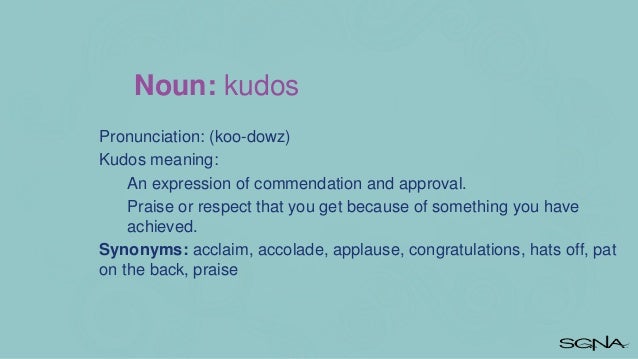

‘I've given out some kudos to Julia Baird and we all vigorously debated Miranda Devine.’.‘Now I have to give credit where it is due, so kudos to all those involved in the major drug bust on Monos Island.’.‘Even the staff at the International Plaza Hotel offered kudos to the conference.’.

‘Still she performed like a trooper and actually did the shoot so kudos to her.’.‘So it isn't as if it is going to bring a lot of extra ratings but it will certainly bring a lot of kudos to the network that did it.’.‘Now on the surface this sounds like a right reasonable question to ask and kudos to the guy who brought it up.’.‘The lone conductor never stood a chance of subduing them, but kudos to her for trying anyway.’.‘Still a win is a win and the champs will find a way to win when its necessary so kudos to Detroit.’.This singular form has developed the meanings “honor” and “statement of praise,Īccolade.” Both the singular form kudo and kudos as a plural are today most common in journalistic writing. Than as a singular mass noun meaning “honor or glory.” The singular form kudo has been produced from kudos by back formation, the same process that gave us the singular pea from pease, originally both singular and plural, sherry from Xeres (an earlier spelling of the Spanish city Jerez), and cherry from the French singular noun cherise.

It is singular or plural and because it ends in -s, the marker of regular plurals in English, kudos has come to be widely regarded and used as a plural noun meaning “accolades” rather kudos is often used, as in these examples, in contexts that do not clearly indicate whether It gained wider currency in the 1920s in journalistic use, particularly in headlines:

He received kudos from everyone on his performance USAGE In the 19th century, kudos 1 entered English as a singular noun, a transliteration of a Greek singular noun kŷdos meaning “praise or renown.” It was at first used largely in academic circles, but


 0 kommentar(er)
0 kommentar(er)
